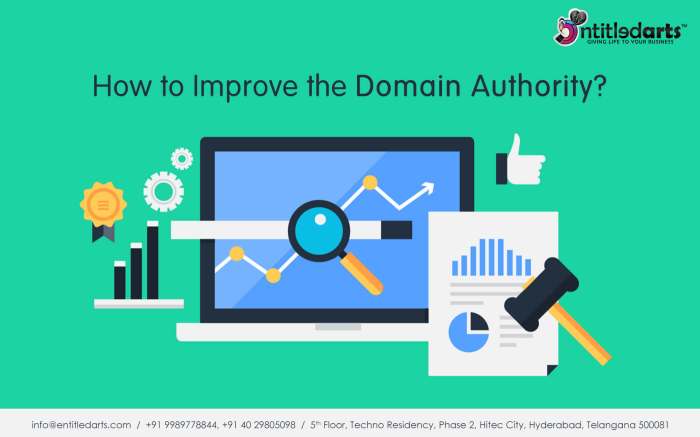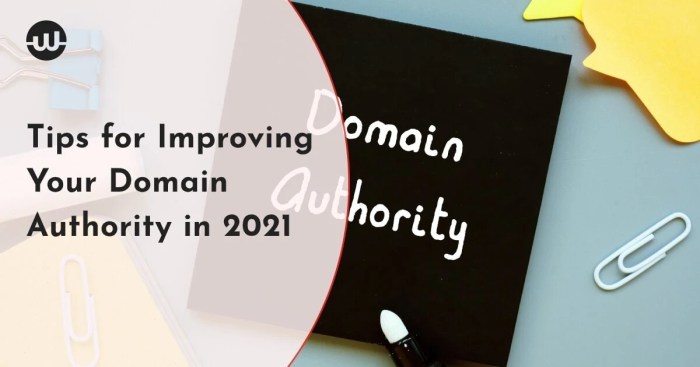Improving Domain Authority sets the stage for this enthralling narrative, offering readers a glimpse into a story that is rich in detail with american high school hip style and brimming with originality from the outset.
Understanding the concept of Domain Authority is crucial for enhancing your website’s performance. From factors influencing it to strategies for improvement, this guide covers it all.
Understanding Domain Authority

Domain Authority is a metric developed by Moz to predict how well a website will rank on search engine results pages (SERPs). It is based on a scale of 1 to 100, with higher scores indicating a greater ability to rank. This metric is crucial in as it helps website owners understand their site’s strength and identify areas for improvement.
Calculation of Domain Authority
Domain Authority is calculated using a variety of factors, including the number of linking root domains, the quality of those domains, and other signals such as MozRank and MozTrust. The algorithm is complex and takes into account numerous variables to provide an accurate score for each website.
- Number of linking root domains: Websites with a higher number of quality backlinks from unique root domains tend to have a higher Domain Authority.
- Quality of linking domains: The authority of the websites linking to your site also plays a significant role in determining Domain Authority.
- MozRank and MozTrust: These metrics measure the quality and trustworthiness of a website’s backlink profile, influencing Domain Authority.
Examples of High and Low Domain Authority Websites
- High Domain Authority: Websites like Wikipedia, Amazon, and Forbes typically have high Domain Authority scores due to their strong backlink profiles and reputation as authoritative sources.
- Low Domain Authority: New websites, personal blogs, or small businesses may have lower Domain Authority scores initially, but they can improve over time with a solid strategy and quality link building efforts.
Factors Influencing Domain Authority: Improving Domain Authority

When it comes to Domain Authority, there are several key factors that play a crucial role in determining the overall score of a website. Understanding these factors is essential for improving and maintaining a high Domain Authority.Quality Backlinks:One of the most important factors influencing Domain Authority is the quality of backlinks pointing to your website. Backlinks from authoritative and relevant websites can significantly boost your Domain Authority.
These backlinks act as a vote of confidence in the eyes of search engines, indicating that your website is trustworthy and valuable.Website Speed:Another factor that impacts Domain Authority is the speed of your website. A slow-loading website can have a negative impact on user experience, leading to higher bounce rates and lower engagement. Search engines like Google take into account website speed when ranking websites, so it’s crucial to optimize your site for faster loading times.Mobile-Friendliness:In today’s mobile-driven world, having a mobile-friendly website is essential for maintaining a high Domain Authority.
Search engines prioritize mobile-friendly websites in their rankings, as they provide a better user experience for mobile users. Ensuring that your website is responsive and optimized for mobile devices can positively influence your Domain Authority score.Remember, focusing on these key factors and continuously working to improve them can help boost your Domain Authority and ultimately enhance your website’s visibility and credibility in the online world.
Strategies for Enhancing Domain Authority
When it comes to enhancing your domain authority, there are several key strategies that can help you improve your website’s credibility and visibility. From creating high-quality content to building a strong social media presence, these tactics can make a significant impact on your domain authority score.
Creating High-Quality, Shareable Content
Creating high-quality content is essential for boosting your domain authority. Focus on providing valuable information that is relevant to your target audience. Make sure your content is well-researched, engaging, and free of errors. By producing shareable content, you increase the chances of other websites linking back to your site, which can improve your domain authority over time.
- Focus on creating original and unique content that stands out from the competition.
- Use relevant s and optimize your content for search engines to increase visibility.
- Include visuals such as images, infographics, and videos to enhance engagement.
- Promote your content on social media platforms to reach a wider audience and encourage sharing.
Significance of Internal Linking, Improving Domain Authority
Internal linking plays a crucial role in improving your domain authority. By linking relevant pages within your website, you not only help users navigate your site more easily but also show search engines the structure and hierarchy of your content. This can help search engines index your pages more effectively and improve your overall .
- Strategically interlink your pages using anchor text that includes relevant s.
- Create a logical hierarchy of internal links to guide users through your site and improve their experience.
- Regularly audit your internal links to ensure they are working correctly and directing users to the right pages.
- Avoid excessive internal linking, as this can appear spammy and negatively impact user experience.
Role of Social Media Presence
Having a strong presence on social media can significantly impact your domain authority. By sharing your content on platforms like Facebook, Twitter, and LinkedIn, you increase your reach and engagement with your audience. Social signals, such as likes, comments, and shares, can also indicate to search engines that your content is valuable and relevant, ultimately boosting your domain authority.
- Engage with your followers and encourage them to interact with your content through likes, comments, and shares.
- Share a mix of your own content and relevant industry news to keep your audience informed and engaged.
- Use social media analytics to track the performance of your posts and optimize your strategy for maximum impact.
- Collaborate with influencers and other brands to expand your reach and increase your credibility within your industry.
Monitoring and Maintaining Domain Authority
Regular website audits are crucial for maintaining Domain Authority as they help identify areas that need improvement and ensure that your site is following best practices. By conducting audits regularly, you can stay on top of any issues that may be affecting your Domain Authority and address them promptly.
Tools and Methods for Tracking Domain Authority Progress
- Utilize tools like Moz’s Domain Authority Checker or Ahrefs to track your Domain Authority over time and monitor any fluctuations.
- Set up Google Analytics to track traffic to your site and see how changes impact your Domain Authority.
- Keep an eye on your site’s performance in search engine rankings to gauge the effectiveness of your efforts in improving Domain Authority.
Fixing Broken Links and Removing Toxic Backlinks
- Regularly check for broken links on your site and fix them to ensure a smooth user experience and prevent negative impacts on your Domain Authority.
- Use tools like Google Search Console to identify toxic backlinks pointing to your site and disavow them to prevent them from harming your Domain Authority.
- Monitor your backlink profile regularly to ensure that you are only receiving high-quality, relevant backlinks that positively contribute to your Domain Authority.
